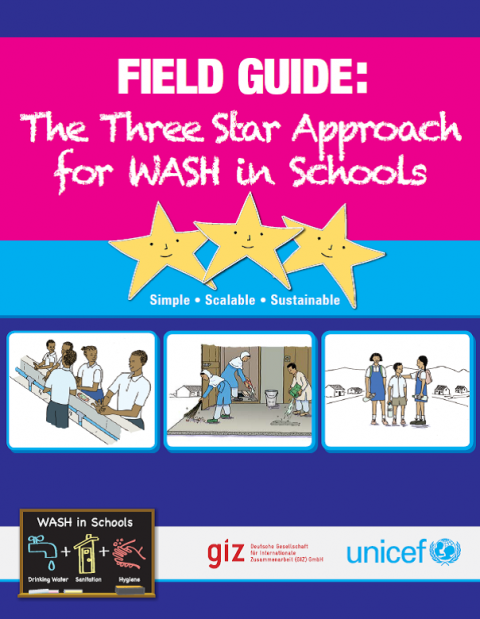
Published in: 2013
Publisher:
United Nations Children's Fund and Deutsche Gesellschaft für Internationale Zusammenarbeit (GIZ), Eschborn, Germany
Author:
UNICEF, GIZ
Uploaded by:
SuSanA secretariat
Partner profile:
common upload
20429 Views
1019 Downloads
Content - Summary
The Three Star Approach for WASH in Schools is designed to improve the effectiveness of hygiene behaviour change programmes. The approach ensures that healthy habits are taught, practised and integrated into daily school routines. The Three Star Approach helps schools meet the essential criteria for a healthy and protective learning environment for children as part of the broader child-friendly schools initiative. It aims to address the bottlenecks that block the effectiveness and expansion of current WASH in Schools programmes.
Acknowledgements :
The Three Star Approach for WASH in Schools is designed to improve the effectiveness of hygiene behaviour change programmes for children and complements UNICEF’s broader child-friendly schools initiative and GIZ’s ‘Fit for School’ approach, which promote safe, healthy and protective learning environments.
UNICEF and GIZ are grateful to the many people who contributed their expertise to developing the Three Star Approach for WASH in Schools concept and who supported the production of this Field Guide.
The following people provided inputs and advice: Zhenbo Yang (China), Mamita Bora Thakkar (India), Bishnu Pokhrel (Mongolia), Anu Pudyal Gautam (Nepal), Emily Bamford, Therese Dooley, Greg Keast, Bob Linney, Catherine Rutgers, Murat Sahin, Yodit Sheido, Peter van Maanen, Carlos Vasquez and Sanjay Wijesekera (New York), Kazumi Inden (Sierra Leone) and Abdulai Kaikai (Sri Lanka), UNICEF; and Bella Monse (Philippines), Habib Benzian (Consultant) and Alexander Schratz (Germany), GIZ.
Bibliographic information
UNICEF, GIZ (2013). Field Guide: The Three Star Approach for WASH in Schools. United Nations Children's Fund and Deutsche Gesellschaft für Internationale Zusammenarbeit (GIZ), Eschborn, Germany
Filter tags
Educators English Guidelines and manuals Recommended by SuSanA (other than SuSanA publications) Schools Sustainable WASH in institutions and gender equality (WG7)















